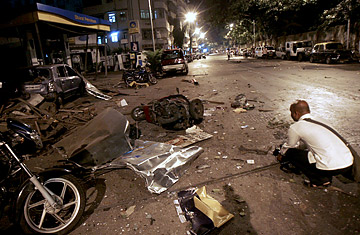
A photographer takes pictures at a blast site in Mumbai. At least 80 people were killed in a series of attacks apparently aimed at tourists in India's financial capital on Wednesday night
The Mumbai operation that killed more than 150 people over two days in the heart of India's commercial capital marks the emergence of an unprecedented hybrid of terror tactics. "This didn't involve suicide bombers and booby-trapped cars that we commonly see in Islamist terror attacks — ones which usually end with the explosion-deaths of the kamikazes carrying them out," notes French terrorism specialist Roland Jacquard. "This is essentially a small army sent into the heart of society with orders kill and keep killing as long as possible. And they're technically capable of creating a lot of damage and death before they can be killed. So this is more like terrorism fused with insurgency and guerilla warfare."
Despite the reports the Mumbai assailants initially sought out British, American and Israeli guests in the luxury hotels they raided, the vast majority of victims so far have been Indian. That suggests that their soft-target selection wasn't designed, as a number of recent spectacular terror strikes have been, to kill as many Westerners as possible — the Mumbai attackers appear simply to have killed whomever they could.
"This detail suggests the group behind this has regional and political objectives particular — and perhaps unique — to Indian Islamists," Jacquard says. "Despite a few common elements with al-Qaeda-inspired attacks, this one didn't come out of the usual international jihad playbook. The state and its security forces aren't being attacked as you'd see in Algeria, Saudi Arabia or Pakistan. And the open-ended and complex nature of the Mumbai operation is strikingly different from the sudden suicide missions we see in Iraq or Afghanistan."
Security officials have long viewed attacks on unprotected targets around the globe frequented by Westerners as a Plan B to the more ambitious attacks on Western populations in their home cities. "The jihadist symbolism may not be as great as attacking an enemy state head on, at home," one French counter-terrorism official argued prior to the Mumbai attacks. "But the panic and horror inflicted by soft-target strikes abroad can unfortunately often be just as great — and as deadly." So much so, in fact, that European security officials see their citizens being at greater risk of being targeted by terrorists abroad than they would be at home. That's one reason France and most other nations have requested citizens to stay out of terror-prone countries such as Algeria, and advise against non-essential travel to places such as Pakistan and Yemen.
In spite of heightened security around the globe in the wake of 9/11 and attacks that followed in Bali, Madrid, London, Casablanca and elsewhere, terrorists can contemplate shopping malls, cinemas or sports events among myriad soft targets available in every city in the world.
"Wherever it is, a soft target is by definition one that's fat and relatively unprotected, and the only way of avoiding them are basically to stay locked away at home and shun all the activities, events, and celebrations that often make life a joy," the French official says. "But if we do that, we give the terrorists what they want."
